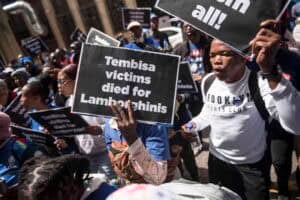He is defiantly challenging a step-aside order in the high court on Thursday and Friday.

With local government polls a few months away, the turmoil fanned by disunity within the ANC over the suspension of embattled secretary-general Ace Magashule, was far from settled – a situation political analysts on Sunday said was likely to cost the party in the elections.
In what is expected to mark a crunch time, the party top brass is this week expected to ponder the implications and react to Magashule’s high court bid to wave his suspension and nullify the ANC step-aside rule.
In court papers, Magashule has argued that the step-aside 27.5 rule adopted by the party’s 2017 Nasrec national conference, was unconstitutional because it violated the principle of “innocent until proven guilty”.
The unprecedented court battle between Magashule, the party, President Cyril Ramaphosa and acting secretary-general Jessie Duarte, has been set for a full bench hearing on Thursday and Friday at the High Court in Johannesburg, with senior counsel Dali Mpofu defending Magashule.
Independent political analyst Dr Ralph Mathekga said Magashule’s court challenge was a strong indication that he was being pushed into a corner.
“He is facing a serious challenge of proving his case in court and a possible expulsion if he escalates the matter further,” warned Mathekga.
Other political experts said the raging clash would have a negative impact for the ANC in the elections, leading to voter apathy by supporters aligned to Magashule.
Said University of Pretoria political science lecturer Roland Henwood: “Implications of the Magashule-ANC tussle are negative for the party in the run-up to the local government elections, especially on the turnout by some party members – though President Ramaphosa is currently the biggest positive for the ANC among voters.”
Henwood said ANC unity was “a myth and, at best, an elusive ideal”.
“The interpretation of rules is dictated by individual interests – [the] same people who previously rejected going to court to settle party matters, are now doing exactly that,” added Henwood.
Concurring with Henwood, University of Johannesburg professor of politics Siphamandla Zondi said the task of building ANC unity was challenged by battles waged inside and outside courts.
“These serve to deepen divisions – not just between Magashule, the top 5 and the NWC [national working committee] but among followers of the two sides.
“What plays out in court papers and outside court, with every appearance, is the enrooting of factionalism, instead of uprooting it. If this continues, the ANC will fight elections on two fronts: internally and against the negative sentiment among voters.
“Amilcar Cabral was right when he said in 1966, a major challenge facing the liberation movement was a battle against its own internal weaknesses.
“The ANC has been weakened more by internal battles than external challenges,” said Zondi.
Said Institute for Global Dialogue political analyst Sanusha Naidu: “The final ANC decision may depend on how fast the court comes to a conclusion on the Magashule matter and to what extent the ANC secretary-general will get the suspension cloud overturned.
“The party is going into this election very fragmented and disunited – already beyond the tipping point when it comes to unity.
“We should start thinking on how the Magashule factor could modernise the party going forward – not just looking at personalities.”






